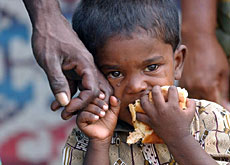
Aid agencies warn against tsunami adoptions

The plight of children in the tsunami-hit regions of southeast Asia has raised interest in Switzerland and other Western countries in adoption.
However, the Swiss authorities and aid organisations say adoption is often not the best way to help.
At least a third of the estimated 150,000 people killed in last month’s earthquake and tidal waves are children, according to the United Nations.
“It is much better to place orphans with families from the same country, if ever feasible,” said Michael Sidman of the Swiss children’s aid organisation, Terre des Hommes’ Asia desk.
Markus Brühwiler from Zurich’s cantonal authorities said adoption by families in Switzerland might be possible and welcome in certain cases. But he added that applications took some time to process.
“In Switzerland alone it takes at least a year to complete all the necessary paperwork,” he told swissinfo.
According to Terre des Hommes, this involves screening of the adoptive parents, submission of the child’s documentation and the necessary entry permit.
Not easy to adopt
David Urwyler of the Federal Justice Office said international organisations were advising against the adoption of children from disaster areas and war zones.
He said that often it was not clear whether children still had parents or other family members alive.
The Terre des Hommes Foundation in Lausanne and other charities have received dozens of inquiries in the past week.
“Some people are disappointed when we tell them that it is not easy to adopt a child,” said spokeswoman Marlène Hofstetter.
Switzerland’s mass-circulation daily, Blick, said it had registered almost 20 inquiries in the past few days.
Child trafficking
Relief agencies have expressed fears that children orphaned by Asia’s tsunami may be easy prey for criminals and be forced into slavery.
The Geneva-based United Nations Children’s Fund (Unicef) said it was alarmed by reports of adults posing as foster parents, and children being shipped from Indonesia for sale in neighbouring Malaysia and Singapore.
An estimated 35,000 children in the Indonesian province of Aceh have lost their families or have been made homeless by the disaster.
Indonesian police are investigating unsolicited approaches to people inviting them to adopt orphans from the devastated Aceh province.
“It is clear that a crisis situation lends itself to exploitation and child trafficking,” said Unicef’s Pierre Philippe.
Child register
The organisation said a top priority was to register displaced and orphaned children from Aceh to protect them from traffickers.
Aid agencies plan to set up special centres across the province for children.
Earlier this week the Indonesian government imposed a nationwide ban on people leaving the country with children from Aceh.
Sri Lanka, another region hit hard by the disaster, announced on Thursday a ban on tsunami adoptions.
Unicef says those who survived the catastrophe are struggling to get hold of food and clean water to withstand diseases.
“December 26, 2004, is a day that will be remembered for broken homes, shattered lives and a haunted generation,” said Unicef spokeswoman Wivina Belmonte.
“When we consider the children, we think particularly of what the trauma will be for them in the coming years.”
swissinfo, Urs Geiser
The Swiss authorities and aid organisations say adoption is often not the best way to help children and families in the disaster region.
Terre des Hommes says it has received dozens of inquiries about adoption over the past few days.
Aid agencies have expressed fears that children orphaned by the tsunami may fall into the hands of child traffickers.

In compliance with the JTI standards
More: SWI swissinfo.ch certified by the Journalism Trust Initiative


























You can find an overview of ongoing debates with our journalists here . Please join us!
If you want to start a conversation about a topic raised in this article or want to report factual errors, email us at english@swissinfo.ch.